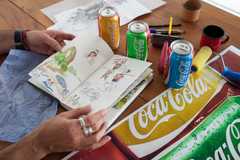World Cup / Global
Creative kicks
World Cup fever is about to break in Brazil so Monocle visits the South American agencies matching the host team’s footballing flair with bold advertising campaigns.
Brazil’s World Cup will be a carnival of commerce as much as a festival of football. While “Brand Brazil” might well be the greatest beneficiary of the tournament, the logos and slogans of official sponsors will become as familiar to a world of TV viewers as those of top players. With fifa controlling rights and even proper nouns – “World Cup” and “Brazil” – with an iron fist, what are the advertising opportunities? monocle takes a creative tour.
01.
Wieden + Kennedy, São Paulo
Coca-Cola
Like Da Vinci authorising some sort of intervention in his “Mona Lisa”, so Coca-Cola agreed that its ever-red cans, recognised from New York to Mongolia, could change their palette in a celebration of football. For the first time, 300 million cans won’t be red but yellow, green and blue to represent the flag of Brazil.
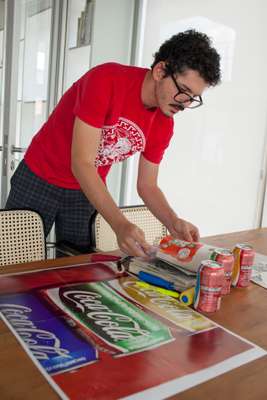

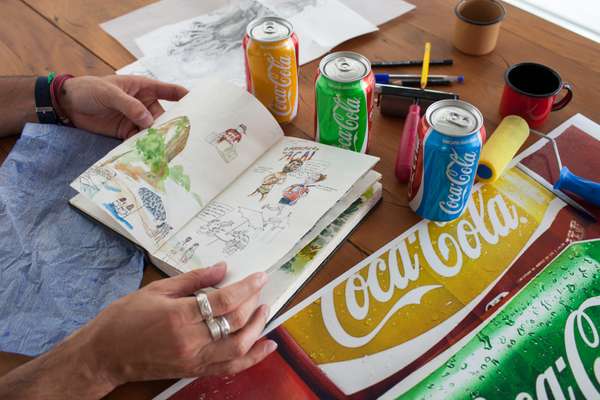
Quite a risk for the company’s executives to see their product painted a similar blue to its main competitor, Pepsi. Wieden + Kennedy’s campaign was launched last June during the Confederations Cup in Brazil and the scene was set for the flag-themed cans. “It is hard to believe that we were able to promote a radical change in such an iconic product like this,” says Argentinian Guillermo Vega, executive creative director at Wieden + Kennedy, the North American agency that planted its flag in São Paulo in 2010 and won the global accounts of Coca-Cola and Nike for this year’s World Cup.
Located in a modern three-storey building in the bohemian neighbourhood of Vila Madalena, Wieden + Kennedy looks more like an adult’s adventure playground or a progressive university campus than a communications agency: dozens of young men and women with tattoos, shorts and flip-flops work on MacBooks. Vega says, “In a traditional job, we would never be allowed to change the colour of the cans. This was only possible because it’s the World Cup. Playing with the colours was an initiative that involved freedom and risk. And also a deep commitment to its history.”
The global concept of the Coca-Cola campaign for the biggest sporting celebration on the planet was named the “World’s Cup”, a manifesto that aims to explore the diversity so associated with Brazil. On a more subjective and inspiring level, the discourse of the creative team led by Vega is that the profusion of colours should escape the cans and spread through the streets of Brazilian cities, especially those that will host the matches. Not surprisingly, after months of research about Brazilian culture, the company invited Speto, one of the leading names in graffiti in Brazil, to create the look of the campaign that associates the drink to the event.
“He worked hard for nine months while developing the visual identity,” says Vega. The drawings made by Speto can already be seen in all advertisements and on cans of Coke. “The great thing about graffiti is the diversity. Everyone has the right to express themselves through this art,” Speto says.
The use of Brazil’s colours is undoubtedly the soul of the Coke campaign for this event. The digital platform for the brand, for example, offers tools so that creative consumers can colour pictures of people, streets, cities and then share their work through social media. “Though the television remains the main vehicle for the dissemination of advertising campaigns, I am sure the internet will make history during this event,” says Vega. “The most watched video in history will be of the World Cup, the most shared photo will be of the World Cup. You’ll see!”
—
Other key clients: Nike, Heineken, Philips and Diageo.
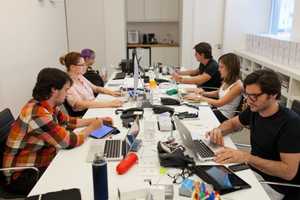
02.
BeGiant + Neogama/BBH, São Paulo
Embratur
“This is an advertisement,” says Felipe Barahona as he shows an episode of the television series Encuentros en Brasil (“Meetings in Brazil”), scheduled to air in May on hbo and broadcast to 53 countries and territories in Latin America and part of the Caribbean. The curious thing, however, is there is little mention of the series sponsor: Embratur, the government-run Brazilian tourism agency. With 12 half-hour episodes, the TV show is a musical and touristic view of Brazil through the eyes of six Latin American artists. Barahona, ceo of agency beGiant, created this in partnership with the more traditional advertising agency Neogama/BBH.
The Hispanic market is the show’s main target. Of the 5.7 million tourists Brazil annually welcomes, 2.6 million come from Latin America. “It’s a unique opportunity to show our diversity,” says Guga Lemes, chief creative officer of BeGiant. Created and executed in just four months, right on time to catch a ride from the euphoria brought on by the World Cup, the plot of the show is far from a football theme. “We wanted to show everything that is waiting for tourists beyond the matches,” says Barahona.
Among the project’s executives are Uruguayan musician Jorge Drexler, winner of an Academy Award for best original song for film The Motorcycle Diaries, and Colombian musician Andrea Echeverri. The result? After the last episode airs, around the time of the first kick-off on 12 June, seven new songs will be available to download, as will an app for audiences to create their own videos from a library of Brazilian images.
—
Other key clients: Volkswagen, Alpargatas (Havaianas) and São Paulo Metrô.
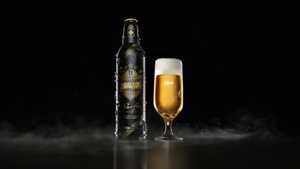
03
Africa, São Paulo
Brahma Seleção Especial
“No one wants to be interrupted by traditional advertising anymore. Brands today want to tell stories and create dialogues, and consumers want something to discuss at the counter of the bar,” says Sérgio Gordilho, one of the most powerful voices in Brazilian advertising.
Gordilho is chief creative officer and co-president of Africa, industry journal Advertising Age’s International Agency of the Year in 2014. In recent months the agency has created bold campaigns focused on the World Cup for some mega-brands and the companies that own them such as Budweiser and P&G.
But it is for Brahma (owned by Anheuser-Busch InBev), Brazil’s best-selling beer and the official brew of the World Cup, that Gordilho and his team have built the most revolutionary and striking advertising campaign. The story started in August last year, when onlookers at the Brazilian football team’s training ground began to notice something unusual in those 150 acres of Atlantic rainforest in Teresópolis, the highland region of Rio state.Instead of footballers, they saw trucks, cameras and one very familiar figure, that of Luiz Felipe Scolari, coach of the Brazilian team, sowing sackfuls of seeds in open furrows.
Two months later, mother nature revealed all: Scolari had planted a special barley that would be used to make an exclusive beer named the Brahma Seleção Especial.Exactly 2,014 units of this pilsener will go on to be sold in a special package containing a glass and Scolari’s autograph, with individual bottles available in supermarkets.
“It was an audacious campaign that not only featured the work of our team but also a good portion of luck,” says Gordilho. “We were at the mercy of several factors such as the soil, the period of planting barley, seed types and hoping for rain.”
The launch film of the barley planting and a testimonial from Scolari was one of the most viewed in Brazil between February and March. “We released it first on the internet because besides being a way to test the product, we could see the public reaction to the idea of planting beer in the field of national soccer team,” says Gordilho.
The launch campaign also includes a special black truck, that will be used to deliver the beer to supermarkets and delis, alongside traditional advertising on street furniture in the main capitals of Brazil. “The concept of our campaign is to show that although not born in Brazil, football is being played in our backyard. And with a special beer created on the sacred grass of our national soccer team we are giving what the customers exactly want: stories that engage and thrill them,” Gordilho adds.
—
Other key clients: P&G, Itaú, Vivo, Embraer and Budweiser.
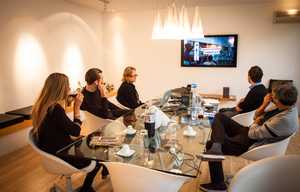
04.
Ponce, Buenos Aires
Rexona/Sure
Ponce is one of two agencies handling the global account for Rexona/Sure deodorant and it’s just days since the Brazilian and Argentinian launch of World Cup-related TV and online spots. The campaign, centred around deodorant cans decked out in national colours, is also being rolled out across the other Latin American countries that have qualified for the competition across outdoor, print and digital media.
The “Fanatics” TV spot features a brief cameo of a famous player from each national team and shows fans crammed around screens or proving their footballing passions. Although it centres on supporters, Ponce’s executive creative director Luigi Ghidotti points out that it doesn’t fall into the traps of more obvious World Cup advertising.
“We try to combine the brand concept, which is ‘Do More’, with something that runs as a counterbalance to other brands. So instead of a fan promising to do something if something happens – like shaving their head if Argentina wins the World Cup, for example – he or she has to do it before, to give the team the strength and support to be able to win.” Using hashtags, fans are encouraged to upload photos or videos to social networks, proving the leftfield things they’re prepared to do for their respective teams.
The campaign, initiated several months before the competition, is unquestionably motivated by the fact that Rexona isn’t an official sponsor – something that can make life hard due to the legal restrictions Fifa puts in place, including not being able to use the words “World Cup”, “Brazil” and “2014” in advertising, alongside official national flags and team kits. Rexona’s campaign, for example, has to rely on the power of suggestion, opening with the words: “The moment has arrived when football paralyses the country.” Hernán Ponce – who founded the agency 16 years ago – says the advert “suggests the idea of football in Latin America” and the passions it engenders, a unique opportunity during the World Cup due to its sheer reach.
For Ponce, Argentina has always had a capacity to approach advertising in a way that can be understood universally and internationally, something that competitors in Brazil and even the UK and US are less capable of, he argues. “Argentina has so much advertising talent and we don’t really know where it comes from,” he adds. “It’s the same with football!”
—
Other key clients: Unilever, TedxRío de la Plata and Stella Artois.

